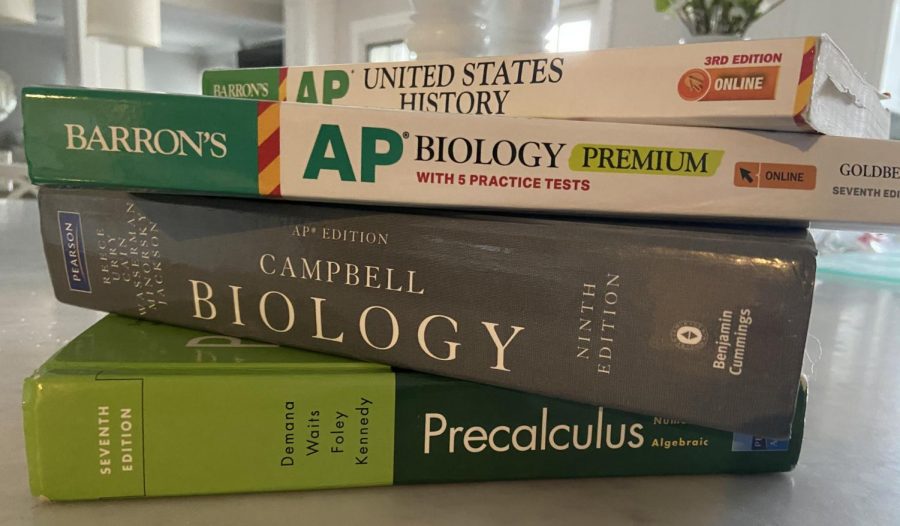OPINION: College Board cares about your wallet, not you
A sinister energy lurks between the dusty spines of your history textbooks. It passes through you like a ghost, leaving goosebumps trailing down your spine and the hair on your neck sticking up. The evil slowly crawls across the West Essex classrooms, announcing its wicked presence through the small creeks of wooden desks and tears of overworked students. This energy feeds on students’ stress and anxiety, preying on their fear to grow stronger. This monster is no Freddy Kruger, but rather something much more terrifying and real: College Board.
In light of the coronavirus pandemic, the educational organization that runs AP testing, the SATs and a host of other standardized tests has done absolutely nothing to accommodate students for the end-of-year AP exams. Despite this year being far from normal, College Board announced that the normally scheduled, full length, full material AP exams will be held on time in May through June. Although they gave schools the option for each test to be on pen and paper or online, students still have to take the test physically in school unless they opt to remain remote for health reasons.
Already coined ‘hell year,’ the burden of normal junior year struggles combine with the mental baggage of a pandemic to create an environment saturated in stress and anxiety. With college applications looming around the corner, I, along with countless other WE students, have been living in a constant state of fear that our academic efforts will be insufficient for the college process. Pandemic aside, AP exams are a significant component considered by college admissions, as passing scores are a huge help in increasing the likelihood of acceptance. Therefore, College Board refusing to alter the exams to accommodate students facing undeniable learning limitations demonstrates how they are setting students up for failure on this year’s exams. In fact, in a Wessex Wire poll of 136 students conducted in March, 53 percent of students stated that they felt unprepared for this year’s AP tests
“College Board’s refusal to modify the tests shows how out of touch they are with today’s students,” junior Aidan Harnflood said. “This can and will decrease our chances of passing the tests. Students this year faced many limitations on their education, and collegeboard’s refusal to modify the test to fit these limitations is unwise and will negatively affect us, the students.
After schools shut down in March 2020 due to the first mandatory lock down, College Board rightfully altered the AP exams last year to adapt to remote testing. Despite losing only two months of in person school, they cut down the exam length from three hours to 45 minutes and included far less material than originally anticipated. This year, however, despite most students nationwide experiencing a full year of mandatory remote learning that was undoubtedly less effective than an in-person education, College Board is adamant about implementing their usual exams with few accommodations.
Students are reasonably appalled by College Board’s lack of initiative to alter the tests in light of the pandemic.
“Last year, AP students learned remotely for a few months and were accommodated by College Board on their exams, but for over a year now we have been learning AP material through a screen in our homes,” junior Lauren Bohrer said. “We have endured a time like we have never experienced before, and we have faced losses in every sense of the word, [yet] College Board is going to sit back and “accommodate” for its AP students like it’s just another “normal” year that calls for “normal” exams. College Board has let us down.”
“College Board has done absolutely nothing for students this year and students last year were babied after missing 2 months of school when we have missed a full year,” a junior who participated in the poll but wishes to remain anonymous said.
Despite teachers’ best attempts to adapt to remote learning, the quality of education students received this year was less efficient than previous years. Learning through Zoom is simply harder than physically being in a classroom where students are forced to pay attention and participate. The confluence of technical difficulties, muted microphones and the seductiveness of your unmade bed cultivates a subpar learning experience no matter the quality of the teachers’ lesson plans. Therefore, students are subject to a lack of comprehension of the AP curriculum, or a least a level of comprehension lower than the expected threshold needed to do well on the AP exam. College Board’s unwillingness to abbreviate the amount of material that students will be tested on demonstrates their ignorance to the struggles students have faced while learning in a pandemic.
“Every AP student I have discussed this topic with has agreed that we have not received a quality of education that comes close to what we have received in pandemic-free years,” Bohrer said. “I do not believe that AP students this year are nearly as prepared as we need to be to take a multitude of exams specifically designed by College Board for full curriculums taught in normal circumstances.”
“College board is giving us the same tests and test methods even though we learned in a completely different environment this year,” a senior who wishes to remain anonymous said. “Expecting us to have the same results is completely unfair–not to mention that students haven’t had any (or for those who were hybrid barely had) tests in person this year, [so] it’s crazy that they expect us to be able to test for hours straight in person.”
Perhaps the most humiliating part of the AP Exam process is the fact that students are forced to actually pay for the emotional terrorism that the exams take on their mental health. Ranging from $90 to $145 apiece, students must cough up huge sums of money for a test that does not even guarantee AP credit. Taking four AP classes this year, I was forced to pay a grand total of $427 in exchange for all nighters, stress hives and tears. The fact that students single-handedly fund the College Board and yet they are still unwilling to listen to our desperate pleas for change demonstrates that their organization was never focused on the students, only their wallets.
As May creeps closer and closer and College Board shows no intent of altering the 2021 AP Exams, students have no choice but to jump through the ridiculous hoops in front of them. In the meantime, I wish the best of luck to all of the AP students at West Essex–we are going to need it.








![[VIDEO] School Spotlight for Spring 2025](https://thewessexwire.com/wp-content/uploads/2020/03/westessex-475x356.jpg)
![[VIDEO] Varsity Media Day: Winter 2025](https://thewessexwire.com/wp-content/uploads/2025/02/vmd-25winter-600x450.jpg)

